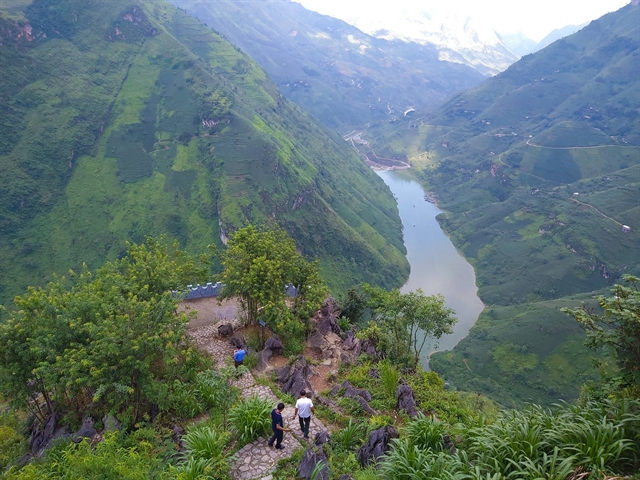Tourism businesses and authorities in the northern province of Ha Giang are implementing several solutions to survive amid the COVID-19 pandemic.

Tourism businesses and authorities in the northern province of Ha Giang are implementing several solutions to survive amid the COVID-19 pandemic.
The tourism sector was the first and worst impacted by the pandemic, with the number of tourists decreasing sharply and the number of tours dropping.
Cancellation of bookings was common for local homestays, hotels and tourism businesses.
The fourth wave of COVID-19 cases in late April this year has pushed many businesses into further difficulties.
According to many tourism establishments, most tours to Ha Giang Province in June were cancelled.
Dinh Quoc Khanh, owner of Sky View Homestay in Suoi Thau 2 Hamlet, Ban Luoc Commune of Hoang Su Phi District, said: “My homestay covers an area of 3,000 sq.m and we invested over VND4 billion (US$173,000). We just opened in early 2020.”
“But since then, we have been continuously affected by the COVID-19 pandemic,” Khanh said.
“During May and June this year, we had to cancel tours and refund tourists,” he said.
The homestay owner had to find ways to maintain income while waiting for the pandemic to be brought under control and tourism activities to resume.
“We decided to plant fruit trees such as plums, pears and peaches to increase our income as well as make the area greener,” she said.
“Along with that, we are trying to promote our image, so that when the pandemic is controlled, we can welcome more guests,” Khanh said.
For tourism businesses, the larger the investment, the greater the damage.
H’mong Village Investment and Tourism Company is one example.
With an investment of over VND80 billion (US$3.5 million), when it first came into operation last year, this facility was also continuously affected by the COVID-19 pandemic due to continuous postponment and cancellation, causing great losses to the business.
In May and June this year, all accommodation bookings in H'Mong Village Resort. Quan Ba District, were cancelled due to the fourth wave of the pandemic spreading to many localities in the country.
Lai Quoc Tinh, the company’s management board chairman, said: "In the difficult situation, we planned to lauch promotion programmes to assure tourists that Ha Giang is a safe destination.”
“We built a programme to welcome tourists for 1 to 2 days, which is enough for visitors to experience the cultural space. The goal was to welcome tourists in Ha Giang and some neighbouring provinces," Tinh said.
Nguyen Hong Hai, director of the provincial Culture, Sport and Tourism Department, said that Ha Giang was one of the provinces that did well in the prevention and control of the COVID-19 pandemic but the provincial tourism industry was still facing great difficulties.
All business establishments, resorts, cultural villages, travel businesses and tourism-related services have been badly affected, he said.
In the first six months this year, Ha Giang Province attracted an estimated 642,000 tourists, just 38 per cent of the regular figure, and total revenue from tourists reached VND1.157 trillion (US$50 million), 37.8 per cent of the yearly plan.
Due to the pandemic, all cultural and tourism events in Ha Giang were postponed, meaning tourism and service businesses had no income.
Business establishments still had to pay salaries, insurance for employees, rental fees and interest that caused losses to these establishments.
“To help tourism businesses survive in the pandemic, the province has directed the tourism industry to coordinate with relevant sectors to focus on guiding and supporting tourism and service businesses to enjoy the supporting policies of the Government and the province to partly ease difficulties,” said Hai.
The province also requested the establishments to strictly comply with anti-pandemic regulations and prepare well for when the pandemic was controlled, he added. — VNS





